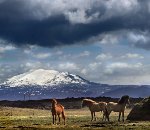 International speculation has begun that Iceland’s Hekla volcano may be about to erupt; but scientists say that there is not yet any indication of when. No eruption is starting at this time.
International speculation has begun that Iceland’s Hekla volcano may be about to erupt; but scientists say that there is not yet any indication of when. No eruption is starting at this time.
Iceland has endured hundreds of volcanic eruptions since human settlement began and most of them have caused little disruption.
Mount Hekla is one of Iceland’s most active volcanoes and last erupted in 2000, 1991 and 1981. Scientists have been expecting a new eruption for several years and recent activity under the mountain seems to have confirmed that the volcano is ready to erupt.
However, geophysicist Pall Einarsson said in interview with IceNews today that the current volcano scare is simply made up: “They are actually quoting me as saying that Hekla will erupt soon; but there is nothing new in this. I’ve been saying this for three or four years and ‘soon’ means different things to journalists and geologists,” he said.
The mountain has risen up by about a metre – a sure sign that magma is close to the surface. But no earthquakes have been measured – which means that an eruption is not immediately imminent. The Icelandic Department of Civil Protection and Emergency Management has advised, as always, to take every precaution when climbing the Hekla mountain.
“The last scare earlier this year, about Bardarbunga which came to nothing, was based on a bad translation from Icelandic. This time there is not even that excuse,” Einarsson continues. “A lot of this news is even built around quotes by ‘experts’ who are not, in fact, real experts. Foreign journalists should get their expert quotes from us at the University of Iceland, or from the Icelandic Met Office; which also has an excellent up-to-date website in English. Journalists should talk to experts and not just take their news from anyone!”
Hekla is not underneath a glacier (as both Eyjafjallajokull and Grimsvotn are); so lava does not come into explosive contact with ice. Hekla therefore is not known for the sort of ash production which causes disruption to aviation.
Historically, when Hekla erupts roughly every ten years its force is moderate and the disruption it causes is minimal. It last erupted 11 years ago. When the gap between eruptions is significantly longer than a decade, the force of eruptions tends to be much bigger. The 2000 eruption was short and was most active during the first couple of hours.
Image: Mbl.is


[…] quote, “No eruption is starting at this time,” caught my attention. This was from an article about an ongoing discussion scientists and journalists are having about the pending eruption of the […]
[…] sci-fi flick ‘Prometheus’ is being filmed in Iceland at the base of Hekla, one of the most active volcanoes in the world (further proof of why Scott is a total […]
[…] Mount Hekla to erupt in Iceland, waiting, waiting.. how soon is soon? cos my boss is flying out today, praying he gets stuck abroad for about a month.. https://www.icenews.is/index.php/2011…ion-sensation/ […]
[…] Icelandic scientist surprised by Hekla volcano eruption sensationIceNewsInternational speculation has begun that Iceland’s Hekla volcano may be about to erupt; but scientists say Read more at News english – iceland – global […]